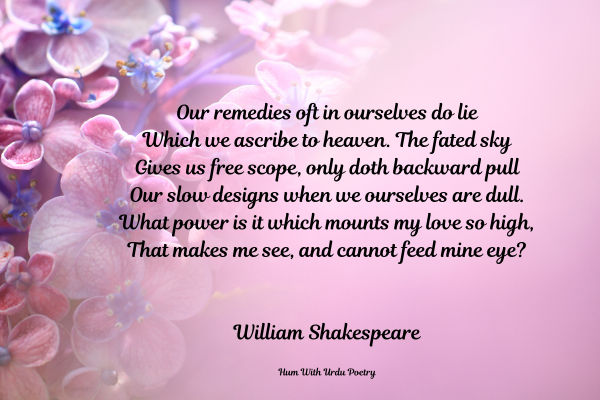William Shakespeare
(All’s Well That Ends Well)
Our remedies oft in ourselves do lie
Which we ascribe to heaven. The fated sky
Gives us free scope, only doth backward pull
Our slow designs when we ourselves are dull.
What power is it which mounts my love so high,
That makes me see, and cannot feed mine eye?
The mightiest space in fortune nature brings
To join like likes and kiss like native things.
Impossible be strange attempts to those
That weigh their pains in sense and do suppose
What hath been cannot be. Who ever strove
To show her merit that did miss her love?
William Shakespeare
…………
Silvia
Who is Silvia? What is she?
That all our swains commend her?
Holy, fair, and wise is she:
The heaven such grace did lend her,
That she might admirèd be.
Is she kind as she is fair?
For beauty lives with kindness:
Love doth to her eyes repair,
To help him of his blindness;
And, being help’d, inhabits there.
Then to Silvia let us sing,
That Silvia is excelling;
She excels each mortal thing
Upon the dull earth dwelling:
To her let us garlands bring.
William Shakespeare
…………
Orpheus With His Lute Made Trees
Orpheus with his lute made trees,
And the mountain tops that freeze,
Bow themselves, when he did sing:
To his music plants and flowers
Ever sprung; as sun and showers
There had made a lasting spring.
Everything that heard him play,
Even the billows of the sea,
Hung their heads, and then lay by.
In sweet music is such art,
Killing care and grief of heart
Fall asleep, or hearing, die.
William Shakespeare
Love
TELL me where is Fancy bred,
Or in the heart or in the head?
How begot, how nourished?
Reply, reply.
It is engender’d in the eyes,
With gazing fed; and Fancy dies
In the cradle where it lies.
Let us all ring Fancy’s knell:
I’ll begin it,–Ding, dong, bell.
All. Ding, dong, bell.
………
Dear Friend
When to the session of sweet silent thought
I summon up remembrance of things past,
I sigh the lack of many a thing I sought,
And with old woes new wail my dear time’s waste:
Then can I drown an eye, unused to flow,
For precious friends hid in death’s dateless night,
And weep afresh love’s long since cancelled woe,
And moan the expense of many a vanish’d sight:
Then can I grieve at grievances foregone,
And heavily from woe to woe tell o’er
The sad account of fore-bemoaned moan,
Which I new pay as if not paid before.
But if the while I think on thee, dear friend,
All losses are restored and sorrows end.

